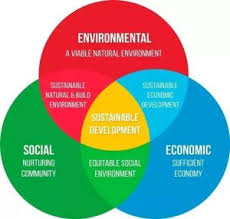Explaining Sustainable Development
Sustainable development is a concept that has gained significant importance in recent years as the global community grapples with environmental challenges and seeks ways to ensure a better future for all.
At its core, sustainable development refers to the practice of meeting the needs of the present without compromising the ability of future generations to meet their own needs. It involves finding a balance between economic growth, social progress, and environmental protection.
One key aspect of sustainable development is environmental sustainability. This involves using natural resources in a way that does not deplete them or harm the environment. It also includes reducing waste and pollution, promoting renewable energy sources, and protecting biodiversity.
Another important component is social sustainability, which focuses on ensuring that all people have access to basic necessities such as food, water, healthcare, education, and employment. It also involves promoting equality, diversity, and social justice.
Economic sustainability is also crucial in sustainable development. This means fostering economic growth that is inclusive, equitable, and environmentally responsible. It involves investing in sustainable industries, creating green jobs, and promoting innovation and technology that benefit both people and the planet.
In conclusion, sustainable development is about taking a holistic approach to development that considers not only economic growth but also social progress and environmental protection. By embracing sustainable practices and policies, we can create a more prosperous and equitable world for present and future generations.
Understanding Sustainable Development: Key Questions and Answers
- What is sustainable development?
- Why is sustainable development important?
- How does sustainable development benefit the environment?
- What are the key principles of sustainable development?
- How can individuals contribute to sustainable development?
What is sustainable development?
Sustainable development is a fundamental principle that aims to meet the needs of the present without compromising the ability of future generations to meet their own needs. It involves striking a delicate balance between economic growth, social progress, and environmental protection. By adopting sustainable practices, we can ensure that our actions today do not jeopardize the well-being and resources of future generations. Sustainable development encompasses environmental sustainability, social equity, and economic prosperity, all working together to create a more resilient and harmonious society for everyone.
Why is sustainable development important?
Sustainable development is crucial for several reasons. Firstly, it ensures that we meet the needs of the present without compromising the ability of future generations to meet their own needs. By preserving natural resources and protecting the environment, we can safeguard our planet for future inhabitants. Additionally, sustainable development promotes economic growth, social equity, and environmental protection simultaneously, creating a balanced and resilient society. It also helps address pressing global issues such as climate change, biodiversity loss, and resource depletion. Ultimately, sustainable development is important as it offers a pathway towards a more prosperous, inclusive, and environmentally sustainable future for all.
How does sustainable development benefit the environment?
Sustainable development benefits the environment by promoting practices that help preserve natural resources, reduce pollution, and protect ecosystems. By adopting sustainable approaches to economic activities, such as using renewable energy sources, reducing waste and emissions, and implementing conservation measures, we can mitigate the negative impacts of human activities on the environment. This not only helps to safeguard biodiversity and ecosystem health but also ensures a cleaner and healthier environment for current and future generations to enjoy. Sustainable development offers a pathway towards a more harmonious relationship between human society and the natural world, fostering long-term environmental sustainability and resilience.
What are the key principles of sustainable development?
Sustainable development is guided by several key principles that shape its approach to balancing economic, social, and environmental considerations. One fundamental principle is the idea of intergenerational equity, which emphasises the importance of meeting the needs of current generations without compromising the ability of future generations to meet their own needs. Another key principle is the integration of economic, social, and environmental goals to ensure a harmonious and balanced approach to development. Additionally, sustainable development promotes participatory decision-making processes that involve stakeholders from all levels of society. It also advocates for the prudent use of natural resources, promoting resource efficiency and conservation. Overall, these principles form the foundation of sustainable development practices aimed at creating a more sustainable and equitable future for all.
How can individuals contribute to sustainable development?
Individuals play a crucial role in contributing to sustainable development through their everyday actions and choices. By adopting sustainable practices such as reducing energy consumption, recycling, conserving water, using public transport or carpooling, supporting local and eco-friendly products, and advocating for environmental protection, individuals can make a significant impact. Additionally, raising awareness about sustainability issues, participating in community clean-up events, volunteering for environmental organizations, and engaging in discussions with policymakers can help drive positive change towards a more sustainable future for all.

No Responses